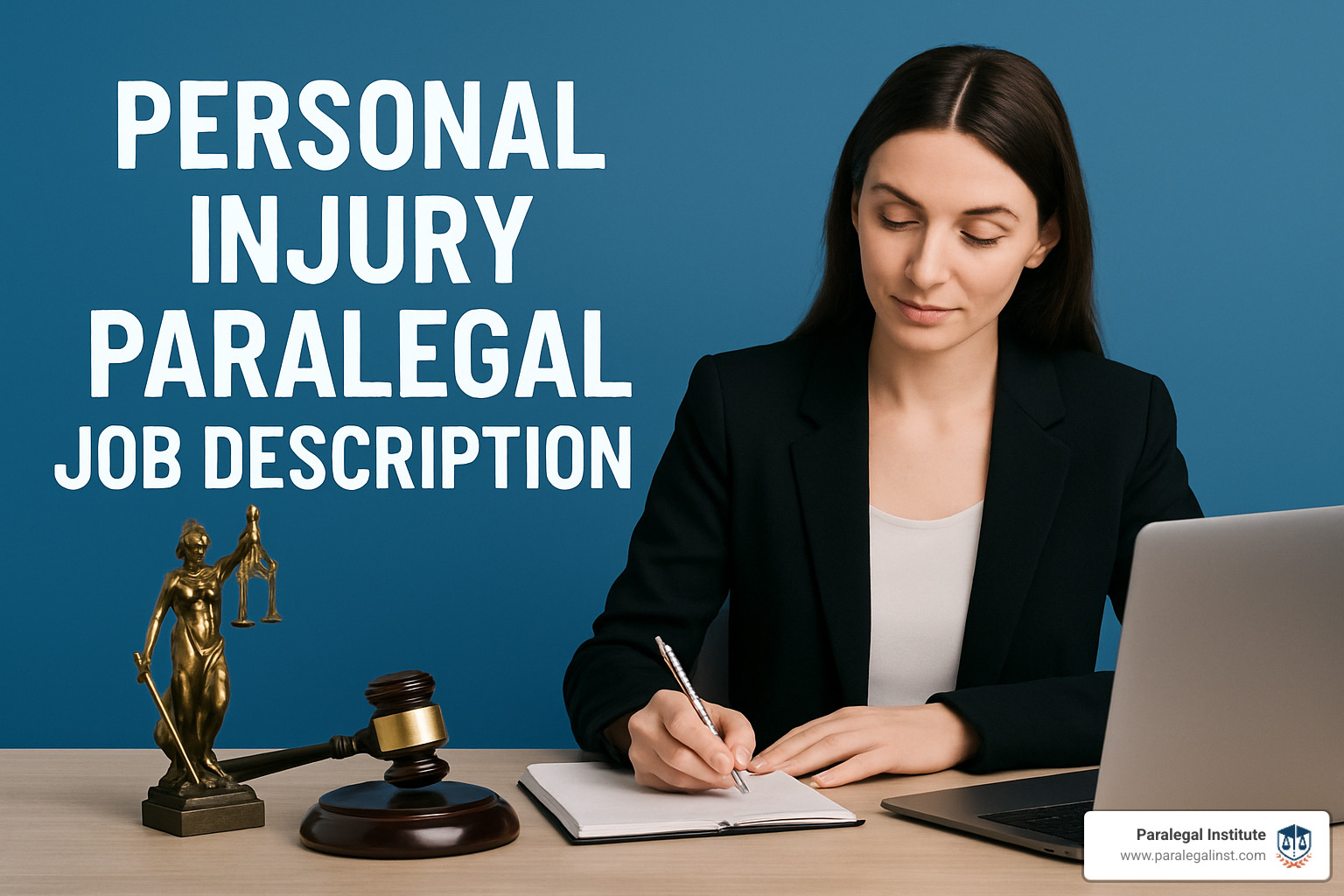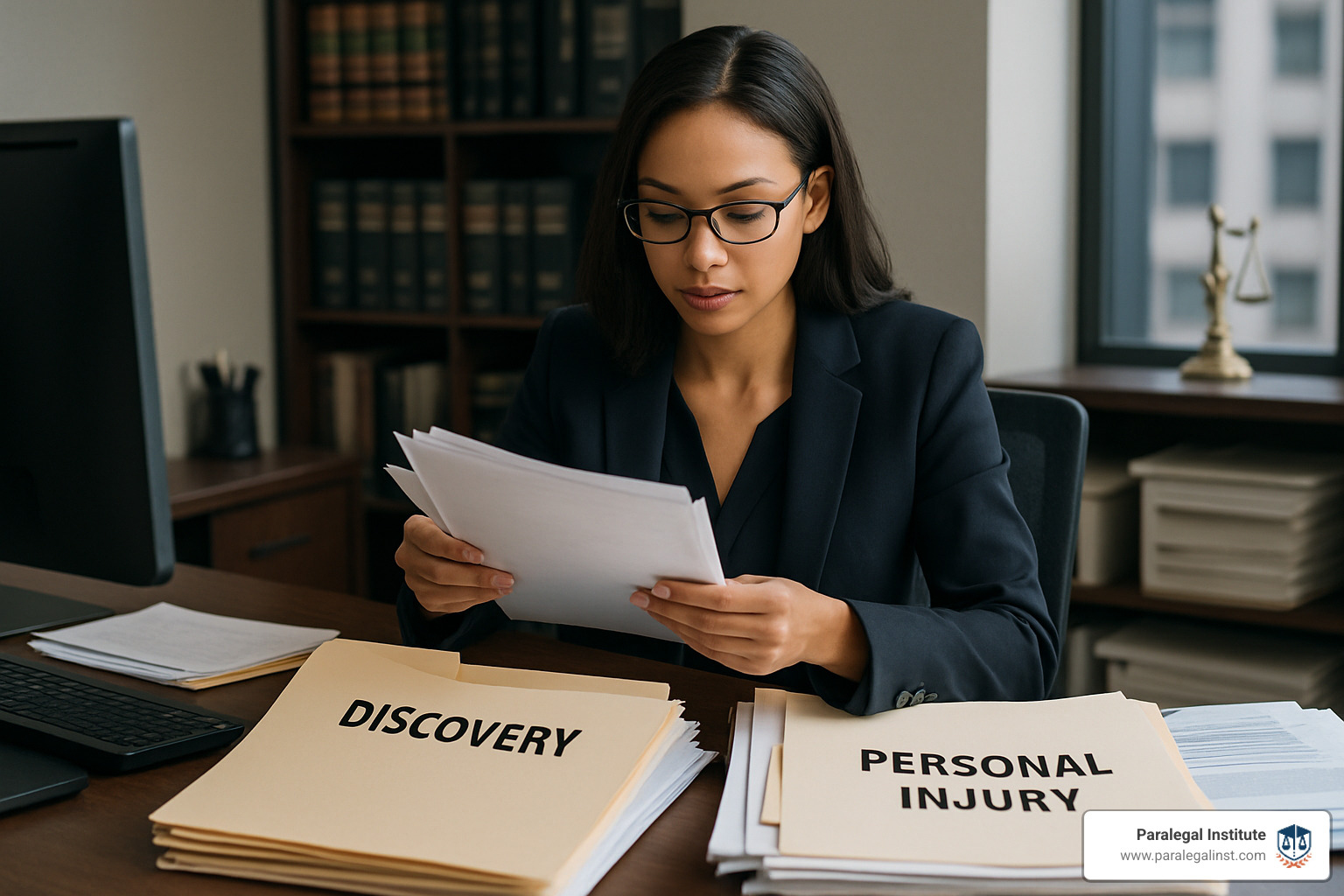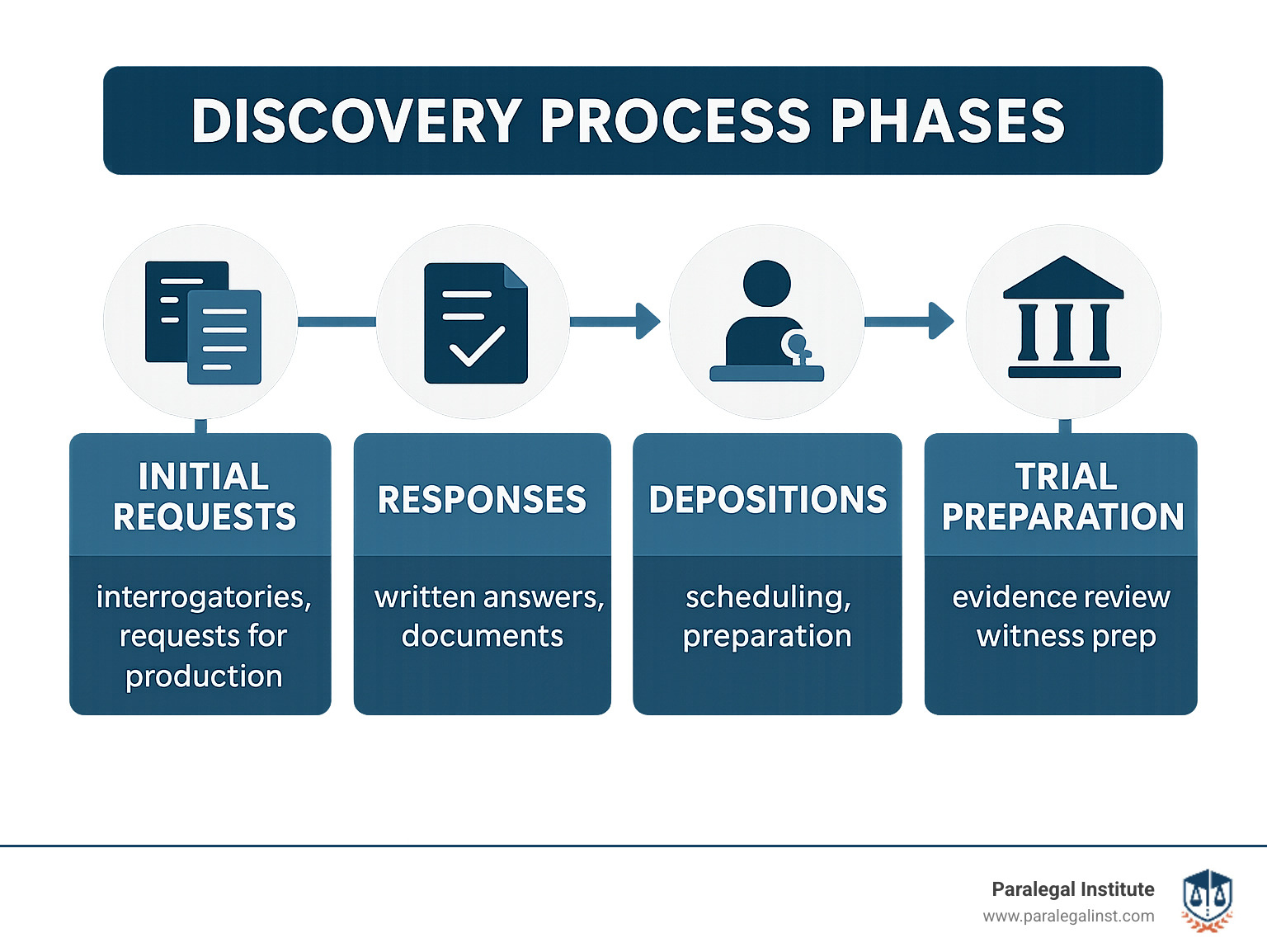Personal Injury Paralegal Job Description Explained (Without the Legal Jargon!)
Why Personal Injury Paralegal Jobs Are in High Demand
A personal injury paralegal job description typically includes managing case files, preparing legal documents, organizing medical records, communicating with clients, and supporting attorneys through every stage of litigation. These professionals are essential to personal injury law firms, handling everything from initial client intake to trial preparation.
Core Responsibilities:
- Draft pleadings, motions, and settlement demands
- Organize and summarize medical records
- Coordinate with medical providers and insurance companies
- Schedule depositions, hearings, and client meetings
- Prepare trial exhibits and witness lists
- Negotiate liens and medical bills
- Maintain case filing systems and deadlines
Required Skills:
- Strong attention to detail and organization
- Basic medical terminology knowledge
- Excellent written and verbal communication
- Proficiency with legal software and case management systems
- Ability to handle sensitive client information
Work Environment:
- Law firms specializing in personal injury
- Insurance companies (defense side)
- Corporate legal departments
- Government agencies
The role offers strong career growth potential, with paralegals earning a median salary nationally, and personal injury specialists often earning more depending on experience and location.
If you're looking for a career with a direct path into the legal field and practical skills for immediate employment, this role is a great fit. Personal injury firms actively seek paralegals who can handle complex medical records, manage multiple cases, and provide compassionate client support during difficult times.
I'm Matthew Pfau, and I've spent years hiring and training paralegals in my personal injury practice, giving me insight into what makes an effective personal injury paralegal and the skills firms actually need. My experience has shown me that the right training can prepare you for this rewarding career faster than you might think.
What Does a Personal Injury Paralegal Actually Do?
Personal injury paralegals keep cases moving while attorneys craft legal strategy. Your mission: support injured clients so they can focus on healing.
You’ll handle car crashes, slip-and-falls, medical malpractice and, in tragic situations, wrongful-death matters. Expect a steady mix of legal paperwork, medical documents and client conversations—often all before lunch.
Primary Duties & Responsibilities
- Draft pleadings, motions and settlement demands
- Order, sort and summarize medical records
- Schedule depositions, hearings and medical exams
- Track statutes of limitation and court deadlines
- Negotiate liens and prepare settlement statements
- Assemble trial exhibits and witness lists
Plaintiff vs. Defense Work
| Plaintiff Paralegal | Defense Paralegal |
|---|---|
| Interview injured clients | Review policy limits |
| Collect records & build damages | Investigate liability & gather exculpatory evidence |
| Prepare demand packages | Analyze records for pre-existing conditions |
| Negotiate medical liens | Coordinate with adjusters & experts |
| Prove duty, breach, causation, damages | Challenge causation & minimize damages |
Both paths demand airtight organization and the ability to translate medical jargon into plain English for attorneys, clients and sometimes juries.
Essential Skills, Knowledge & Tools for Success
Personal injury work blends detective skills with client care. You’ll juggle dozens of deadlines and still need the patience to reassure someone who’s in pain.
Key skills:
- Meticulous attention to detail—one missed page can sink a case
- Empathy and clear communication with stressed clients
- Time management across many active files
- Basic medical terminology and record review
- Comfort with legal tech and e-filing procedures
Mastering Medical Lingo
You’ll read more MRIs than motions, so learn common abbreviations—Fx (fracture), Dx (diagnosis), MMI (maximum medical improvement). Keep a running glossary and review the medical abbreviation list to stay sharp.
Must-Have Tech
Most PI firms rely on:
- Case-management platforms (TrialWorks, Needles, Filevine)
- Calendar/docketing tools that guard deadlines
- Document automation (HotDocs, TheFormTool)
- Research databases (Westlaw, Lexis)
Proficiency with Microsoft Office and a knack for learning new software matter more than mastering a single brand-name program. For deeper tips, see our Legal Research Guide for Paralegals.

Path to the Job: Education, Certificates & Must-Have Credentials
Getting into personal injury paralegal work doesn't require years of schooling or expensive degrees. Most firms care more about what you can actually do than where you went to school. The key is finding training that teaches you the specific skills personal injury firms need right now.
The Reality About Personal Injury Paralegal Training
Here's what most people don't realize: personal injury firms want paralegals who can hit the ground running. They need someone who understands medical records, can manage multiple cases, and knows how to communicate with clients who are going through tough times. Traditional academic programs often miss these practical skills entirely.
That's why our 15-week paralegal certificate program focuses on exactly what you'll be doing in your first week on the job. Instead of spending months on legal theory, you'll learn how to organize medical records, draft demand letters, and use the case management software that firms actually rely on.
What Makes Training Actually Useful
The best paralegal training programs teach you through hands-on experience rather than just textbooks. You'll work with real case files, practice client communication scenarios, and master the medical terminology that shows up in every personal injury case. This practical approach means you walk into interviews already knowing how to do the job.
Medical knowledge is especially crucial for personal injury work. You need to understand what doctors mean when they write about herniated discs, radiculopathy, or maximum medical improvement. Many paralegals struggle because they never learned to read medical records properly.
Technology skills matter just as much. Personal injury firms run on case management software, and paralegals who can steer these systems efficiently become invaluable team members. Learning these tools during training saves you from the stress of figuring them out under pressure.
Building Your Professional Network
Networking might sound intimidating, but it's often how the best opportunities come about. Many personal injury paralegals find their positions through connections with other legal professionals rather than online job boards. Professional associations offer great ways to meet people in the field and learn about job openings before they're posted publicly.
Continuing education keeps you valuable throughout your career. The legal field changes constantly, and paralegals who stay current with new laws, technology, and procedures advance faster than those who don't. Many firms will pay for additional training once you're hired.
The Certificate Advantage
A paralegal certificate from a focused program like ours signals to employers that you have the specific skills they need. Unlike lengthy academic programs, certificate training concentrates on practical abilities that translate directly to workplace success.
Our approach works because it's designed by practicing legal professionals who understand what makes a personal injury paralegal job description successful. We focus on the skills that matter most: case management, client communication, medical record analysis, and legal document preparation.
For more insights on developing the practical skills that employers actually value, check out our guide on building practical skills in paralegal training.
The path to becoming a personal injury paralegal is more straightforward than you might think. With the right training and commitment to learning, you can be ready for this rewarding career in just a few months.
Inside the Workday & Discovery Process
A typical morning starts with coffee and a quick scan of your case-management dashboard. Are any statutes expiring? Has the court issued new hearing dates? Those answers set your priorities for the day.
Core daily tasks:
- Return client calls and emails with empathy
- Follow up on outstanding medical records
- Draft or answer discovery—interrogatories, requests for production and admissions
- Update the attorney on anything that could affect case value or deadlines
Case Management & Trial Preparation
Whether a matter settles next month or sees a jury next year, every record you organize today supports the endgame. Pre-trial work includes:
- Coordinating witnesses and experts
- Building exhibit lists
- Researching jury instructions
- Creating concise treatment timelines
When settlement talks heat up you’ll compile demand packages, calculate damages, and negotiate lien reductions. If trial becomes necessary, you’ll be in court managing exhibits and witnesses while the attorney argues the case.

Discovery 101
Discovery is the formal exchange of information. Deadlines are strict—typically 30 days—so strong calendaring is non-negotiable. Smart paralegals:
- Use templates for routine requests
- Track every document sent or received
- Summarize depositions for quick attorney review

Career Outlook, Salary & Growth
Personal injury paralegals enjoy steady demand—accidents happen in every economy. National median pay for paralegals is solid, and specialists often command the higher end, especially in large metro areas such as Las Vegas, NV.
Your income grows with experience, medical-record expertise, software mastery and the complexity of cases you can handle. Benefits often include health insurance, retirement plans and performance bonuses.
Moving Up
Common advancement paths:
- Senior paralegal – supervise files and mentor new staff
- Litigation specialist – focus on findy or trial support
- Office manager – run day-to-day firm operations
- Law school – some leverage their experience to become attorneys
Continuing education, networking and mentorship accelerate each step. Check the Bureau of Labor Statistics for up-to-date employment data.
Frequently Asked Questions about Personal Injury Paralegal Job Description
How is a paralegal certificate different from certification?
This question comes up constantly, and I completely understand the confusion. A paralegal certificate is what you earn by completing an educational program like ours at Paralegal Institute. It's proof that you've finished structured training in legal principles, procedures, and practical skills.
Think of it this way: when you complete our 15-week program, you receive a paralegal certificate that shows employers you've mastered the fundamentals of personal injury paralegal work. This certificate demonstrates you're ready to handle real cases from day one.
Most employers actually prefer candidates with paralegal certificates from recognized programs because they know these graduates have hands-on experience with the tools and techniques personal injury firms use daily. Our certificate approach gets you into the workforce quickly with practical skills rather than keeping you in classrooms for years.
The beauty of certificate training is that it focuses on what you'll actually do on the job. You'll learn to manage case files, work with medical records, and use legal software - skills that make you valuable to employers immediately.
Do personal injury paralegals have to know medical terminology?
Absolutely, and here's why it matters more than you might think. Medical knowledge is often more critical than legal knowledge for personal injury paralegals. You'll spend significant time reviewing medical records, coordinating with healthcare providers, and understanding how injuries impact clients' lives.
Don't panic though - you don't need to become a doctor! But you should be comfortable learning medical terminology and understanding basic anatomy. When you can interpret a medical record that shows a client's lumbar spine injury affects their ability to work, you're providing real value to your firm.
Essential medical skills include understanding common medical abbreviations like Fx for fracture and Dx for diagnosis. You'll also need to interpret treatment timelines, communicate effectively with doctors and medical staff, and calculate medical expenses accurately.
The good news is that our program includes medical terminology training specifically designed for personal injury paralegals. We teach you what you actually need to know, not unnecessary medical theory. You'll learn to recognize pre-existing conditions that might affect case value and understand how to organize medical records in ways that support your client's case.
What software should I learn before applying?
Case management software proficiency significantly improves your employment prospects, but don't stress if you haven't used specific programs yet. Popular systems in personal injury firms include Clio, Needles, and Filevine. However, most firms provide training on their preferred systems.
What's more important is demonstrating comfort with technology generally and strong proficiency with Microsoft Office Suite, particularly Word and Excel. Electronic filing systems are becoming standard everywhere, so familiarity with court e-filing portals gives you an advantage.
The reality is that every firm uses slightly different software, so adaptability matters more than knowing one specific program. Employers want to see that you can learn new systems quickly and use technology to work efficiently.
Our program includes training on industry-standard software, so you'll graduate with practical experience using the tools personal injury firms rely on daily. This hands-on approach means you won't be starting from scratch when you land your first personal injury paralegal job description opportunity.
Conclusion
Starting a career as a personal injury paralegal means stepping into a role where you'll make a real difference in people's lives while building valuable professional skills. The personal injury paralegal job description reveals a career that's both challenging and deeply rewarding, offering the perfect blend of legal expertise and human compassion.
What makes this career path so appealing is the combination of job security and meaningful work. While other industries face uncertainty, personal injury law remains steady because accidents happen regardless of economic conditions. You'll earn a competitive salary while helping injured clients steer one of the most difficult periods of their lives.
The role itself is wonderfully diverse. One day you might be organizing medical records for a car accident case, the next you're coordinating with expert witnesses for a slip-and-fall trial. You'll master medical terminology, become proficient with case management software, and develop the communication skills that help clients feel heard and supported during their recovery.
Career advancement opportunities abound for motivated paralegals. You can specialize in complex litigation, advance to case management roles, or even use your experience as a stepping stone to law school. The skills you develop - attention to detail, client communication, and legal writing - transfer beautifully to other legal specialties if you decide to explore different areas later.
What sets successful personal injury paralegals apart is their ability to balance technical competence with genuine empathy. Yes, you need to understand medical records and manage complex deadlines, but you also need to remember that behind every case file is someone dealing with pain, stress, and uncertainty about their future.
The pathway to this career doesn't require years of academic study. Our 15-week certificate program focuses on the practical skills personal injury firms actually need. You'll learn from practicing legal professionals who understand what employers want, gaining hands-on experience with real case management scenarios.
If you're looking for a career that offers stability, growth potential, and the satisfaction of helping others during their most challenging moments, personal injury paralegal work might be exactly what you're searching for. The legal field needs skilled, compassionate professionals who can handle complex cases with both competence and care.
Ready to take that first step? Find how our comprehensive training approach prepares you for immediate employment in the personal injury field through our legal support staff training program. Your new career helping others while building your own professional future starts here.










